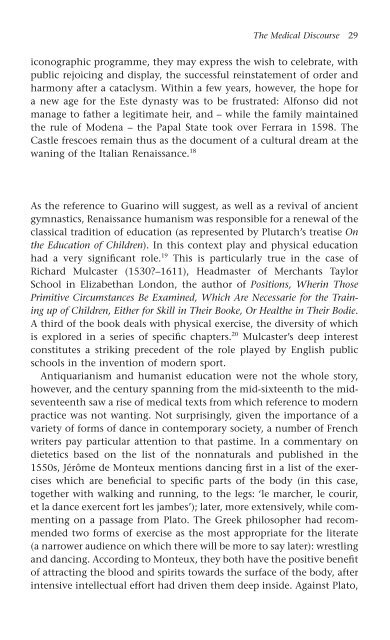Recreation in the Renaissance
Recreation in the Renaissance
Recreation in the Renaissance
- No tags were found...
You also want an ePaper? Increase the reach of your titles
YUMPU automatically turns print PDFs into web optimized ePapers that Google loves.
The Medical Discourse 29<br />
iconographic programme, <strong>the</strong>y may express <strong>the</strong> wish to celebrate, with<br />
public rejoic<strong>in</strong>g and display, <strong>the</strong> successful re<strong>in</strong>statement of order and<br />
harmony after a cataclysm. With<strong>in</strong> a few years, however, <strong>the</strong> hope for<br />
a new age for <strong>the</strong> Este dynasty was to be frustrated: Alfonso did not<br />
manage to fa<strong>the</strong>r a legitimate heir, and – while <strong>the</strong> family ma<strong>in</strong>ta<strong>in</strong>ed<br />
<strong>the</strong> rule of Modena – <strong>the</strong> Papal State took over Ferrara <strong>in</strong> 1598. The<br />
Castle frescoes rema<strong>in</strong> thus as <strong>the</strong> document of a cultural dream at <strong>the</strong><br />
wan<strong>in</strong>g of <strong>the</strong> Italian <strong>Renaissance</strong>. 18<br />
As <strong>the</strong> reference to Guar<strong>in</strong>o will suggest, as well as a revival of ancient<br />
gymnastics, <strong>Renaissance</strong> humanism was responsible for a renewal of <strong>the</strong><br />
classical tradition of education (as represented by Plutarch’s treatise On<br />
<strong>the</strong> Education of Children). In this context play and physical education<br />
had a very significant role. 19 This is particularly true <strong>in</strong> <strong>the</strong> case of<br />
Richard Mulcaster (1530–1611), Headmaster of Merchants Taylor<br />
School <strong>in</strong> Elizabethan London, <strong>the</strong> author of Positions, Wher<strong>in</strong> Those<br />
Primitive Circumstances Be Exam<strong>in</strong>ed, Which Are Necessarie for <strong>the</strong> Tra<strong>in</strong><strong>in</strong>g<br />
up of Children, Ei<strong>the</strong>r for Skill <strong>in</strong> Their Booke, Or Heal<strong>the</strong> <strong>in</strong> Their Bodie.<br />
A third of <strong>the</strong> book deals with physical exercise, <strong>the</strong> diversity of which<br />
is explored <strong>in</strong> a series of specific chapters. 20 Mulcaster’s deep <strong>in</strong>terest<br />
constitutes a strik<strong>in</strong>g precedent of <strong>the</strong> role played by English public<br />
schools <strong>in</strong> <strong>the</strong> <strong>in</strong>vention of modern sport.<br />
Antiquarianism and humanist education were not <strong>the</strong> whole story,<br />
however, and <strong>the</strong> century spann<strong>in</strong>g from <strong>the</strong> mid-sixteenth to <strong>the</strong> midseventeenth<br />
saw a rise of medical texts from which reference to modern<br />
practice was not want<strong>in</strong>g. Not surpris<strong>in</strong>gly, given <strong>the</strong> importance of a<br />
variety of forms of dance <strong>in</strong> contemporary society, a number of French<br />
writers pay particular attention to that pastime. In a commentary on<br />
dietetics based on <strong>the</strong> list of <strong>the</strong> nonnaturals and published <strong>in</strong> <strong>the</strong><br />
1550s, Jérôme de Monteux mentions danc<strong>in</strong>g first <strong>in</strong> a list of <strong>the</strong> exercises<br />
which are beneficial to specific parts of <strong>the</strong> body (<strong>in</strong> this case,<br />
toge<strong>the</strong>r with walk<strong>in</strong>g and runn<strong>in</strong>g, to <strong>the</strong> legs: ‘le marcher, le courir,<br />
et la dance exercent fort les jambes’); later, more extensively, while comment<strong>in</strong>g<br />
on a passage from Plato. The Greek philosopher had recommended<br />
two forms of exercise as <strong>the</strong> most appropriate for <strong>the</strong> literate<br />
(a narrower audience on which <strong>the</strong>re will be more to say later): wrestl<strong>in</strong>g<br />
and danc<strong>in</strong>g. Accord<strong>in</strong>g to Monteux, <strong>the</strong>y both have <strong>the</strong> positive benefit<br />
of attract<strong>in</strong>g <strong>the</strong> blood and spirits towards <strong>the</strong> surface of <strong>the</strong> body, after<br />
<strong>in</strong>tensive <strong>in</strong>tellectual effort had driven <strong>the</strong>m deep <strong>in</strong>side. Aga<strong>in</strong>st Plato,










